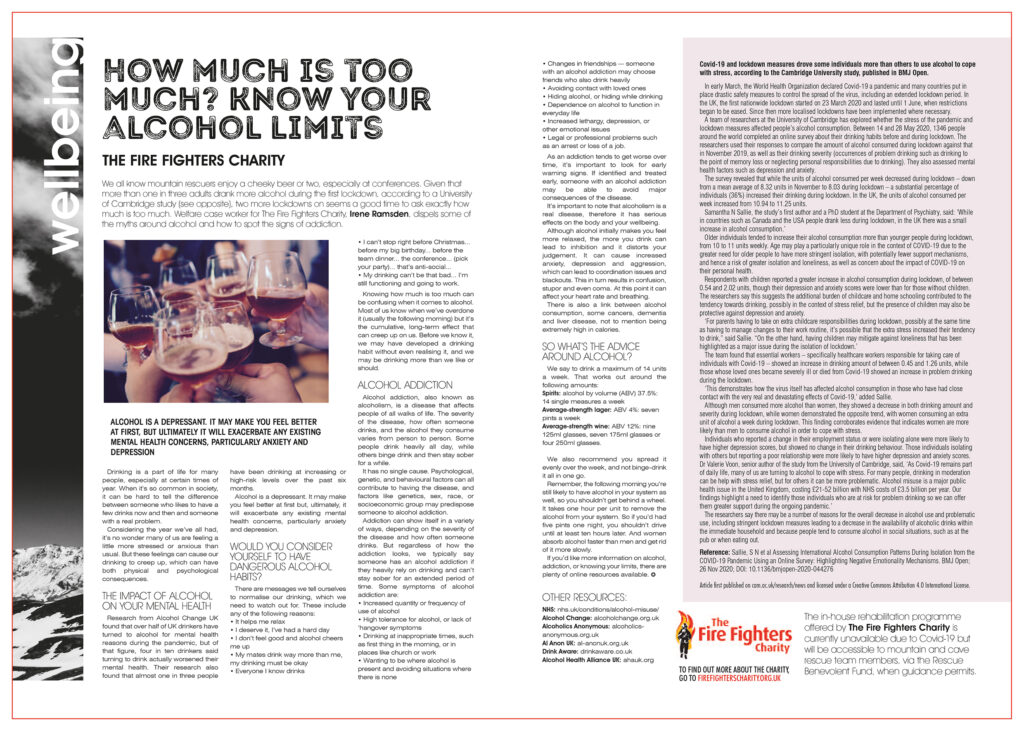How much is too much? Know your alcohol limits
We all know mountain rescuers enjoy a cheeky beer or two, especially at conferences. But how much is too much?
From the archive: Mountain Rescue Magazine issue 76, Spring 2021. Irene Ramsden, welfare case worker for the Fire Fighters’ Charity.

Given that more than one in three adults drank more alcohol during the first lockdown, according to a University of Cambridge study (below), two more lockdowns (and several months on) seems a good time to know your alcohol limits, dispel some of the myths and explore how to spot the signs of addiction.
Drinking is a part of life for many people, especially at certain times of year. When it’s so common in society, it can be hard to tell the difference between someone who likes to have a few drinks now and then and someone with a real problem.
Considering the year we’ve all had, it’s no wonder many of us are feeling a little more stressed or anxious than usual. But these feelings can cause our drinking to creep up, which can have both physical and psychological consequences.
Alcohol is a depressant. It may make you feel better at first, but ultimately it will exacerbate any existing mental health concerns, particularly anxiety and depression
The impact of alcohol on your mental health
Research from Alcohol Change UK found that over half of UK drinkers have turned to alcohol for mental health reasons during the pandemic. Of that figure, four in ten drinkers said turning to drink worsened their mental health. Their research also found that almost one in three people have been drinking at increasing or high-risk levels over the past six months.
Alcohol is a depressant. It may make you feel better at first but, ultimately, it will exacerbate any existing mental health concerns, particularly anxiety and depression.
Do you consider yourself to have dangerous alcohol habits?
There are messages we tell ourselves to normalise our drinking, which we need to watch out for. These include any of the following reasons:
- It helps me relax
- I deserve it, I’ve had a hard day
- I don’t feel good and alcohol cheers me up
- My mates drink way more than me, my drinking must be okay
- Everyone I know drinks
- I can’t stop right before Christmas… before my big birthday… before the team dinner… the conference… (pick your party)… that’s anti-social…
- My drinking can’t be that bad… I’m still functioning and going to work.
Knowing how much is too much can be confusing when it comes to alcohol. Most of us know when we’ve overdone it (usually the following morning), but it’s the cumulative effect that creeps up on us. We may have developed a drinking habit without realising it, drinking more than we like or should.
Alcohol addiction
Alcohol addiction, also known as alcoholism, is a disease that affects people of all walks of life. The severity of the disease, how often someone drinks, and the alcohol they consume varies from person to person. Some drink heavily all day, others binge drink and stay sober for a while.
It has no single cause. Psychological, genetic and behavioural factors all contribute to the disease, and factors like genetics, sex, race or socioeconomic group may predispose someone to alcohol addiction.
Addiction shows itself in a variety of ways, depending on the severity of the disease and how often someone drinks. But regardless of how the addiction looks, we typically say someone has an alcohol addiction if they heavily rely on drink and can’t stay sober for an extended period.
Spotting the symptoms
- Increased quantity or frequency of use of alcohol
- High tolerance for alcohol, or lack of ‘hangover symptoms
- Drinking at inappropriate times, such as first thing in the morning, or in places like church or work
- Wanting to be where alcohol is present and avoiding situations where there is none
- Avoiding contact with loved ones
- Changes in friendships — an alcohol addict may choose friends who also drink heavily
- Dependence on alcohol to function in everyday life
- Hiding alcohol, or hiding while drinking
- Increased lethargy, depression, or other emotional issues
- Legal or professional problems such as an arrest or loss of a job.
Spotting the warning signs of a deepening addiction
As an addiction tends to get worse over time, it’s important to look for early warning signs. If identified and treated early, an alcohol addict may be able to avoid major consequences of the disease.
It’s important to note that alcoholism is a real disease. It has serious effects on the body and your wellbeing.
Although alcohol initially makes you feel more relaxed, the more you drink can distort your judgement. It can cause anxiety, depression and aggression, leading to coordination issues and blackouts. This can result in confusion, stupor and even coma. At this point, it can affect your heart rate and breathing.
There is also a link between alcohol consumption, some cancers, dementia and liver disease. Not to mention being extremely high in calories.
So what’s the advice around alcohol?
We say to drink a maximum of 14 units a week. That works out around the following amounts:
Spirits: alcohol by volume (ABV) 37.5%: 14 single measures a week
Average-strength lager: ABV 4%: seven pints a week
Average-strength wine: ABV 12%: nine 125ml glasses, seven 175ml glasses or four 250ml glasses.
We also recommend you spread it evenly over the week, and not binge-drink it all in one go.
Remember, the following morning you’re still likely to have alcohol in your system, so you shouldn’t get behind a wheel. It takes one hour per unit to remove alcohol from your system. So if you’d had five pints one night, you shouldn’t drive until at least ten hours later. And women absorb alcohol faster than men and get rid of it more slowly.
If you’d like more information on alcohol, addiction, or knowing your limits, there are plenty of online resources available. The NHS and Drinkaware are good starting points.

Covid-19 and lockdown measures drove some individuals more than others to use alcohol to cope with stress, according to the Cambridge University study, published in BMJ Open.
In early March, the World Health Organization declared Covid-19 a pandemic. Many countries put in place drastic safety measures to control the spread of the virus, including an extended lockdown period. In the UK, the first nationwide lockdown started on 23 March 2020 and lasted until 1 June, when restrictions began to be eased. Since then more localised lockdowns have been implemented where necessary.
A team of researchers at the University of Cambridge has explored whether the stress of the pandemic and lockdown measures affected people’s alcohol consumption. Between 14 and 28 May 2020, 1346 people around the world completed an online survey about their drinking habits before and during lockdown.
Looking at the amount of alcohol consumed and drinking severity
Researchers used their responses to compare the amount of alcohol consumed during lockdown to November 2019, as well as the occurrences of drinking to the point of memory loss or neglecting personal responsibilities. They also assessed mental health factors such as depression and anxiety.
Substantial percentage increased drinking during lockdown
The survey revealed that while the units of alcohol consumed per week decreased during lockdown – from a mean average of 8.32 units in November to 8.03 during lockdown — a substantial percentage (36%) increased their drinking during lockdown. In the UK, the units of alcohol consumed per week increased from 10.94 to 11.25 units.
Samantha N Sallie, the study’s first author and a PhD student at the Department of Psychiatry, said: ‘While in countries such as Canada and the USA people drank less during lockdown, in the UK there was a small increase in alcohol consumption.’
Older individuals more likely to increase alcohol consumption than younger people
Older individuals tended to increase their alcohol consumption more than younger people during lockdown, from 10 to 11 units weekly. Age may play a unique role in the context of Covid-19 due to the greater need for older people to have more stringent isolation, with potentially fewer support mechanisms. Hence a risk of greater isolation and loneliness, alongside concern about the impact of Covid-19 on their personal health.
Respondents with children reported greater increase in alcohol consumption
Respondents with children reported a greater increase in alcohol consumption during lockdown, between 0.54 and 2.02 units. And their depression and anxiety scores were lower than for those without children. This suggests the additional burden of childcare and home schooling contributed to the tendency towards drinking, possibly in the context of stress relief. The presence of children may also be protective against depression and anxiety.
‘For parents having to take on extra childcare responsibilities during lockdown, possibly at the same time as having to manage changes to their work routine, it’s possible the extra stress increased their tendency to drink,’ said Sallie. ‘On the other hand, having children may mitigate against loneliness that has been highlighted as a major issue during the isolation of lockdown.’
The impact of Covid on essential healthcare workers
The team found that essential workers – specifically healthcare workers responsible for taking care of individuals with Covid-19 – showed an increase in drinking amount of between 0.45 and 1.26 units. Those whose loved ones became severely ill or died from Covid-19 showed an increase in problem drinking during the lockdown.
‘This demonstrates how the virus itself has affected alcohol consumption in those who have had close contact with the very real and devastating effects of Covid-19,’ added Sallie.
Although men consumed more alcohol than women, they showed a decrease in both drinking amount and severity during lockdown, while women demonstrated the opposite trend, with women consuming an extra unit of alcohol a week. This finding corroborates evidence that indicates women are more likely than men to consume alcohol in order to cope with stress.
Some individuals more likely to have higher depression scores
Individuals who reported a change in their employment status or were isolating alone were more likely to have higher depression scores, but showed no change in their drinking behaviour. Those individuals isolating with others but reporting a poor relationship were more likely to have higher depression and anxiety scores. Dr Valerie Voon, senior author of the study from the University of Cambridge, said, ‘As Covid-19 remains part of daily life, many of us are turning to alcohol to cope with stress.
Moderate drinking can help stress relief, but for others it can be problematic
For many, drinking in moderation can be help with stress relief. For others it can be more problematic. Alcohol misuse is a major public health issue in the UK, costing £21-52 billion with NHS costs of £3.5 billion per year. Our findings highlight a need to identify those individuals who are at risk for problem drinking so we can offer them greater support.’
There may be a number of reasons for the overall decrease in alcohol use and problematic use. Stringent lockdown measures may lead to a decrease in the availability of alcoholic drinks within the immediate household and people tend to consume alcohol in social situations.
Reference
Sallie, S N et al Assessing International Alcohol Consumption Patterns During Isolation from the Covid-19 Pandemic Using an Online Survey: Highlighting Negative Emotionality Mechanisms. BMJ Open; 26 Nov 2020; DOI: 10.1136/bmjopen-2020-044276. Article first published on cam.ac.uk/research/news and licensed under a Creative Commons Attribution 4.0 International License